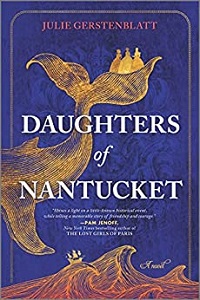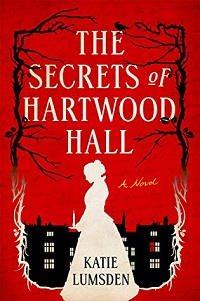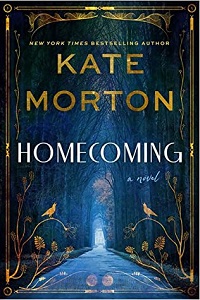Which ones are you interested in, or are there others you're eagerly anticipating? I'm not sure when I'll get to these since my review schedule is packed over the next few months, but I hope to read them eventually. For a more comprehensive look at historical fiction for 2023, please see the Historical Novel Society forthcoming title listing or this Goodreads list.
 Janie Chang's newest novel (after The Library of Legends, which I enjoyed very much) takes her to WWI-era France, showing a Chinese woman's friendship with a Frenchwoman during a time of great strife, and what happens after secrets from the past are revealed. William Morrow, Feb. 2023. [see on Goodreads]
Janie Chang's newest novel (after The Library of Legends, which I enjoyed very much) takes her to WWI-era France, showing a Chinese woman's friendship with a Frenchwoman during a time of great strife, and what happens after secrets from the past are revealed. William Morrow, Feb. 2023. [see on Goodreads]We know (especially from reading historical fiction) that many women of science and medicine weren't given the respect or credit they deserved for their work. Lynn Cullen's timely historical novel focuses on epidemiologist Dorothy Horstmann and the quest to develop a polio vaccine in the 1940s and '50s. Berkley, Feb. 2023. [see on Goodreads]
 The "Lioness of Boston" in Emily Franklin's novel is outspoken Gilded Age philanthropist and art collector Isabella Stewart Gardner, centering on how she became a leading light of the Boston art scene. Godine, April 2023. [see on Goodreads]
The "Lioness of Boston" in Emily Franklin's novel is outspoken Gilded Age philanthropist and art collector Isabella Stewart Gardner, centering on how she became a leading light of the Boston art scene. Godine, April 2023. [see on Goodreads] Another New England-set historical novel, and a debut for Gerstenblatt: the intertwining stories of three women of Nantucket as the island's great fire breaks out in 1846. The trio includes a captain's wife, a free Black merchant, and astronomer Maria Mitchell. MIRA, March 2023. [see on Goodreads]
Another New England-set historical novel, and a debut for Gerstenblatt: the intertwining stories of three women of Nantucket as the island's great fire breaks out in 1846. The trio includes a captain's wife, a free Black merchant, and astronomer Maria Mitchell. MIRA, March 2023. [see on Goodreads]
The tagline of "Three women. Five centuries. One secret" gets me very curious! An Englishwoman, an ancestress of the novel's contemporary heroine, was put on trial for witchcraft in the early 17th century. Three women are linked by the gendered violence they've all faced, and perhaps by something else. I sense this will appeal to readers of Sarah Penner's The Lost Apothecary as well as fans of witch-themed fiction. St. Martin's, March 2023. [see on Goodreads]
 Last week, the author was a presenter at Library Journal's latest Day of Dialog sessions for librarians. Charles Ignatius Sancho is a historical figure, a man who was born on a slave ship and became, among other achievements, an abolitionist, merchant, writer, and the first Black man to vote in Britain in the 1770s. The publisher describes his fictional diaries as "for fans of Bridgerton," which may be true, although this sounds like a very different (less fluffy, for one) sort of read. Henry Holt, April 2023. [see on Goodreads]
Last week, the author was a presenter at Library Journal's latest Day of Dialog sessions for librarians. Charles Ignatius Sancho is a historical figure, a man who was born on a slave ship and became, among other achievements, an abolitionist, merchant, writer, and the first Black man to vote in Britain in the 1770s. The publisher describes his fictional diaries as "for fans of Bridgerton," which may be true, although this sounds like a very different (less fluffy, for one) sort of read. Henry Holt, April 2023. [see on Goodreads] Because this title was postponed from the fall, there's been a lot of buzz about it on social media already. Kennedy's debut novel was a gothic feast, so I'm expecting the same of this new book, in addition to a deep dive into regional color and lore. It's described as a multi-period tale set partly in the Depression-era Ozarks that follows three women linked by family and an evil presence. Lake Union, Feb. 2023. [see on Goodreads]
Because this title was postponed from the fall, there's been a lot of buzz about it on social media already. Kennedy's debut novel was a gothic feast, so I'm expecting the same of this new book, in addition to a deep dive into regional color and lore. It's described as a multi-period tale set partly in the Depression-era Ozarks that follows three women linked by family and an evil presence. Lake Union, Feb. 2023. [see on Goodreads] I do enjoy Gothic sagas, and this one has classic elements: a supposedly cursed old mansion in Victorian England, a governess, creepy night-time noises, and creepier secrets. But the heroine in Lumsden's novel is a recent widow rather than a naïve ingenue, and I look forward to seeing what other tropes are upended. Dutton, Feb. 2023. [see on Goodreads]
I do enjoy Gothic sagas, and this one has classic elements: a supposedly cursed old mansion in Victorian England, a governess, creepy night-time noises, and creepier secrets. But the heroine in Lumsden's novel is a recent widow rather than a naïve ingenue, and I look forward to seeing what other tropes are upended. Dutton, Feb. 2023. [see on Goodreads] Kate Morton's novels are auto-buys for me (she's among my favorite authors, and though they only appear every few years, they're worth waiting for) so of course I had to list her upcoming book here. Set mostly in Australia, Homecoming moves between contemporary times and 1959 as a journalist investigates a notorious, decades-old tragedy. Mariner, April 2023. [see on Goodreads]
Kate Morton's novels are auto-buys for me (she's among my favorite authors, and though they only appear every few years, they're worth waiting for) so of course I had to list her upcoming book here. Set mostly in Australia, Homecoming moves between contemporary times and 1959 as a journalist investigates a notorious, decades-old tragedy. Mariner, April 2023. [see on Goodreads] Set in the British-ruled Caribbean following the Emancipation Act of 1834, this debut novel follows a courageous woman from a Barbados plantation in search of the five children who were sold away from her during slavery. As with Paterson Joseph's novel, above, Shearer was a speaker at LJ's Day of Dialog. [see on Goodreads]
Set in the British-ruled Caribbean following the Emancipation Act of 1834, this debut novel follows a courageous woman from a Barbados plantation in search of the five children who were sold away from her during slavery. As with Paterson Joseph's novel, above, Shearer was a speaker at LJ's Day of Dialog. [see on Goodreads] Another of the debuts on this list, Kai Thomas's novel also takes place in the 19th century and covers a lesser-known part of North American history: the story of the Black and Indigenous people whose life stories played out along the Underground Railroad in the U.S. and Canada. Viking, Jan. 2023. [see on Goodreads]
Another of the debuts on this list, Kai Thomas's novel also takes place in the 19th century and covers a lesser-known part of North American history: the story of the Black and Indigenous people whose life stories played out along the Underground Railroad in the U.S. and Canada. Viking, Jan. 2023. [see on Goodreads] Verble is a literary historical fiction writer and Pulitzer finalist (for her debut, Maud's Line) who's an enrolled citizen of the Cherokee Nation. In Stealing, her fourth novel, she tells the story of a Cherokee child sent to live at a Christian boarding school, the harsh treatment and abuse she endures, and her determination to break away. Important history retold as fiction. Mariner, Feb. 2023. [see on Goodreads]
Verble is a literary historical fiction writer and Pulitzer finalist (for her debut, Maud's Line) who's an enrolled citizen of the Cherokee Nation. In Stealing, her fourth novel, she tells the story of a Cherokee child sent to live at a Christian boarding school, the harsh treatment and abuse she endures, and her determination to break away. Important history retold as fiction. Mariner, Feb. 2023. [see on Goodreads]















